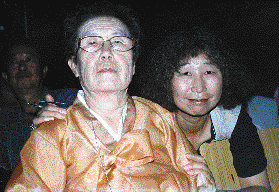WITNESS UNBOWED
Page 3 of 5
| "One day the police came and took my father away." |
He said, 'I feel sorry,' but his voice was hardly audible." Her hand holding a Coke bottle to her mouth shook a little. "It must be hard on you to talk about such a painful past all the time, especially at the public meetings." "Oh, but I have lived for these opportunities. In any case, my past is never over whether I talk about it or not. I am still in the battle every day. So often my dreams are battlefields in which I am desperately fighting the Japanese soldiers. In the darkness of the night, I scream and yell. Then, my husband wakes me up and gently wipes away the cold sweat pouring over my body." I did not have to ask her to tell me her story. In fact, there was no stopping. We talked until the sun set in the sky of that ancient city and shared dinner at a hotel restaurant. Alas, space does not allow me to present her full story, but this is her story in the first person.

Former "comfort woman" Chung Seo Woon (left) told her story to writer Dai Sil Kim-Gibson at the 1995 NGO Forum on Women held in Beijing.
They Defiled My Body,
Not My Spirit
As told by Chung Seo Woon
 was born as the only daughter without sons in the family of a wealthy
landowner in southern Korea. I know that the majority of the women who
suffered my fate came from poor and uneducated families but I was a
protected child of a well-to-do family. Like many of my friends, I wanted to
go to school but my father would not let me. He said, "What's the use of
learning Japanese language and history before you know your own?" He kept
me at home and taught me Chinese characters, written Korean, and
calligraphy. My father was adamantly opposed to changing our names into
Japanese. So we never did. In those days, the Japanese took all of our
brassware to use for the war, for weapons, etc. My father dug a deep hole in
our rice field and buried all of our brassware. He said that it wasn't because
we had such an attachment to them but he was opposed in principle to
contributing to the Japanese war effort. One day police came and took my
father away. I learned that the police took my father to the hiding place and
made him dig it up. When they found all that brassware, they kicked and
beat my father. I don't know how they found out about it. My father was
put into a prison. We asked to see my father every day but each time we
were refused. One day, however, a Japanese official came and asked if I
wanted to visit my father in the prison.
PAGE 4
was born as the only daughter without sons in the family of a wealthy
landowner in southern Korea. I know that the majority of the women who
suffered my fate came from poor and uneducated families but I was a
protected child of a well-to-do family. Like many of my friends, I wanted to
go to school but my father would not let me. He said, "What's the use of
learning Japanese language and history before you know your own?" He kept
me at home and taught me Chinese characters, written Korean, and
calligraphy. My father was adamantly opposed to changing our names into
Japanese. So we never did. In those days, the Japanese took all of our
brassware to use for the war, for weapons, etc. My father dug a deep hole in
our rice field and buried all of our brassware. He said that it wasn't because
we had such an attachment to them but he was opposed in principle to
contributing to the Japanese war effort. One day police came and took my
father away. I learned that the police took my father to the hiding place and
made him dig it up. When they found all that brassware, they kicked and
beat my father. I don't know how they found out about it. My father was
put into a prison. We asked to see my father every day but each time we
were refused. One day, however, a Japanese official came and asked if I
wanted to visit my father in the prison.
PAGE 4
CONTACT US
|
ADVERTISING INFO
© 1996-2013 Asian Media Group Inc
No part of the contents of this site may be reproduced without prior written permission.
